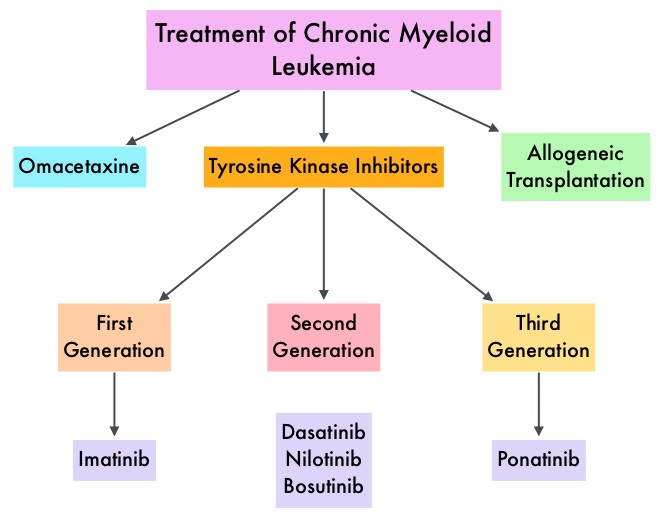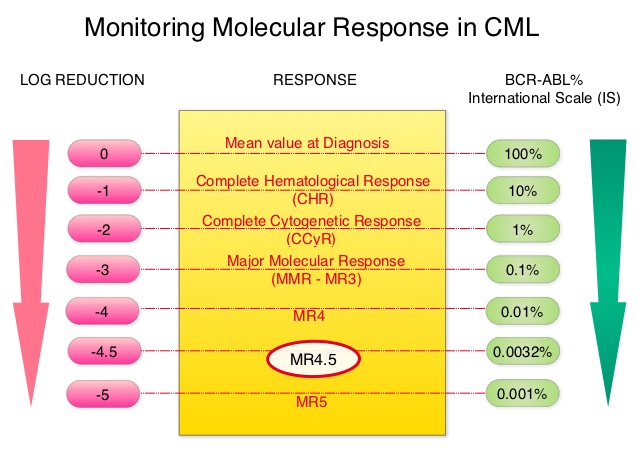SUMMARY: Chronic Myeloid Leukemia (CML) constitutes approximately 10% of all new cases of leukemia. The American Cancer Society estimates that 6,660 new CML cases will be diagnosed in the United States in 2015 and about 1,140 people will die of the disease. The hallmark of CML, the Philadelphia Chromosome (Chromosome 22), is a result of a reciprocal translocation between chromosomes 9 and 22, wherein the ABL gene from chromosome 9, fuses with the BCR gene on chromosome 22. As a result, the auto inhibitory function of the ABL gene is lost and the BCR-ABL fusion gene is activated resulting in cell proliferation and leukemic transformation of hematopoietic stem cells. Gleevec® (Imatinib) inhibits the BCR-ABL tyrosine kinase and is the standard first line treatment, of Ph chromosome positive (Ph+) leukemias. Lack of response due to resistance to GLEEVEC® and in some instances drug intolerance, has led to the development of newer agents including Second and Third generation Tyrosine Kinase Inhibitors (TKIs). Resistance to Gleevec® and other TKIs sharing the same therapeutic target (BCR-ABL kinase), has been attributed to point mutations in the ABL kinase domain, amplification of the BCR-ABL gene as well as other BCR- ABL independent mechanisms such as upregulation of SRC kinases. Mutation analysis at the time of TKI failure, utilizing high sensitivity sequencing techniques such as Next Generation Sequencing, can give clinically relevant information related to low level mutations and compound mutations and this information in turn, can dictate choice of second line therapy.
Gleevec® (Imatinib) inhibits the BCR-ABL tyrosine kinase and is the standard first line treatment, of Ph chromosome positive (Ph+) leukemias. Lack of response due to resistance to GLEEVEC® and in some instances drug intolerance, has led to the development of newer agents including Second and Third generation Tyrosine Kinase Inhibitors (TKIs). Resistance to Gleevec® and other TKIs sharing the same therapeutic target (BCR-ABL kinase), has been attributed to point mutations in the ABL kinase domain, amplification of the BCR-ABL gene as well as other BCR- ABL independent mechanisms such as upregulation of SRC kinases. Mutation analysis at the time of TKI failure, utilizing high sensitivity sequencing techniques such as Next Generation Sequencing, can give clinically relevant information related to low level mutations and compound mutations and this information in turn, can dictate choice of second line therapy.  The Second generation TKIs, TASIGNA® (Nilotinib) and SPRYCEL® (Dasatinib) although initially approved for second line treatment of CML after GLEEVEC® resistance or intolerance, are now FDA approved for the treatment of newly diagnosed Chronic Phase CML. This approval was based on the rapid and superior Major Molecular Responses (MMR) noted, when compared to GLEEVEC®. Now, that the Second generation TKIs are being used as first line therapy, the choice of second line therapy after failure with Second generation TKIs has become more nebulous. It is clear however that, patients with primary cytogenetic resistance to ï¬rst and second line therapy do not beneï¬t from sequential therapy with Second generation TKIs and BCR-ABL mutation analysis should be performed in all patients who develop TKI resistant disease. Before switching from a Second to a Third generation TKI such as Ponatinib, the following considerations should be taken into account
The Second generation TKIs, TASIGNA® (Nilotinib) and SPRYCEL® (Dasatinib) although initially approved for second line treatment of CML after GLEEVEC® resistance or intolerance, are now FDA approved for the treatment of newly diagnosed Chronic Phase CML. This approval was based on the rapid and superior Major Molecular Responses (MMR) noted, when compared to GLEEVEC®. Now, that the Second generation TKIs are being used as first line therapy, the choice of second line therapy after failure with Second generation TKIs has become more nebulous. It is clear however that, patients with primary cytogenetic resistance to ï¬rst and second line therapy do not beneï¬t from sequential therapy with Second generation TKIs and BCR-ABL mutation analysis should be performed in all patients who develop TKI resistant disease. Before switching from a Second to a Third generation TKI such as Ponatinib, the following considerations should be taken into account
BCR-ABL Mutations and Sensitivity to Second Generation TKIs
1) Patients with F317L/V/I/C mutations are more sensitive to TASIGNA® (Nilotinib) or BOSULIF® (Bosutinib) than to SPRYEL® (Dasatinib)
2) Patients with V299L mutation are more sensitive to TASIGNA® than to BOSULIF® or SPRYCEL®
3) Patients with Y253F/H, E255K/V, and F359V/I/C mutations are more sensitive to SPRYCEL® or BOSULIF® than to TASIGNA®
Tolerability of Second Generation TKIs
1) Patients who experience pleural effusion during SPRYCEL® treatment might better tolerate TASIGNA® or BOSULIF®
2) Patients who experience rash during treatment with TASIGNA® or BOSULIF® could be switched to SPRYCEL®
3) Some toxicities common with other TKIs such as pleural effusion and cardiac toxicity are less common with BOSULIF® and this agent also has activity against many BCR-ABL kinase domain mutations resistant to GLEEVEC®, SPRYCEL® and TASIGNA®, with the exception of T315I mutation.
It should be noted that Second generation TKI as third line therapy has limited value in majority of the patients with CML. ICLUSIG® (Ponatinib) is a Third generation kinase inhibitor approved for the treatment of patients with T315I positive CML or T315I-positive Philadelphia Chromosome positive Acute Lymphoblastic Leukemia (Ph+ ALL) and for whom no other TKI is indicated. Other treatment options include SYNRIBO® (Omacetaxine Mepesuccinate), a first-in-class Cephalotaxine and a semi synthetic purified Homoharringtonine (HHT) compound. Unlike Tyrosine Kinase Inhibitors , SYNRIBO® is a protein synthesis inhibitor and reduces the levels of multiple Oncoproteins including BCR-ABL, BCL-2, MCL-1 and promotes apoptosis of leukemic stem cells. This agent is presently approved for the treatment of Chronic or Accelerated phase Chronic Myeloid Leukemia (CML) with resistance and/or intolerance to two or more Tyrosine Kinase Inhibitors, with cytopenias being the most common toxicity. Allogeneic Hematopoietic Stem Cell transplantation should be considered for eligible patients with T315I mutation not responding to ICLUSIG®, those with mutations resistance to second and third generation TKIs and patients with Accelerated or Blast phase CML, following remission with TKIs. Use of Second- and Third-Generation Tyrosine Kinase Inhibitors in the Treatment of Chronic Myeloid Leukemia: An Evolving Treatment Paradigm. Jabbour E, Kantarjian H and Cortes J. Clinical Lymphoma, Myeloma & Leukemia 2015;15:323-334

